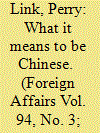|
|
|
Sort Order |
|
|
|
Items / Page
|
|
|
|
|
|
|
| Srl | Item |
| 1 |
ID:
147214


|
|
|
|
|
| Summary/Abstract |
Xi Jinping became the General Secretary of the Communist Party of China in November 2012 and the President of the People’s Republic of China in March 2013. Ever since, under his leadership as the Chinese President, the Chinese Communist Party (CCP) has been progressively tightening its control over the media. In a Communist structure, the media is perceived to be the ‘mouthpiece’ of the Party and is supposed to be used for propaganda. Media is a very essential tool in spreading the government agenda and controlling the public discourse. In fact, the CCP had established the Department of Propaganda as early as in the year 1920.11. Erping Zhang, ‘Sars: Unmasking Censorship In China’, China Rights Forum, Seeds of Change, No. 3, 2003, p. 46, at http://www.hrichina.org/sites/default/files/PDFs/CRF.3.2003/Erping_Zhang.pdf (Accessed February 20, 2013).View all notes As David Bandurski put it, ‘press control is an essential element of political life in China and it is also real and immediate.’22. David Bandurski, ‘Jousting with Monsters: Journalists in a Rapidly Changing China’, in Timothy B. Weston and Lionel M. Jensen (eds.),China in and beyondtheHeadlines, Rowman & Littlefield, Lanham, MD, 2012, p. 29.View all notes Xi has taken the cue from his predecessors and has in fact gone past them to impose new controls over an already tame media in the name of strengthening the ideas of ‘peace and stability’ in Chinese society.
|
|
|
|
|
|
|
|
|
|
|
|
|
|
|
|
| 2 |
ID:
137527


|
|
|
|
|
| Summary/Abstract |
What does it mean to be Chinese? A strong tradition in premodern China held that it meant thinking, behaving, and living in a society in accord with heaven-sanctioned principles exemplifying the best way to be human. Other peoples could learn this Chineseness, and they could also become civilized, but they could never rival China in either defining propriety or drawing people into accordance with it.
|
|
|
|
|
|
|
|
|
|
|
|
|
|
|
|
|
|
|
|
|